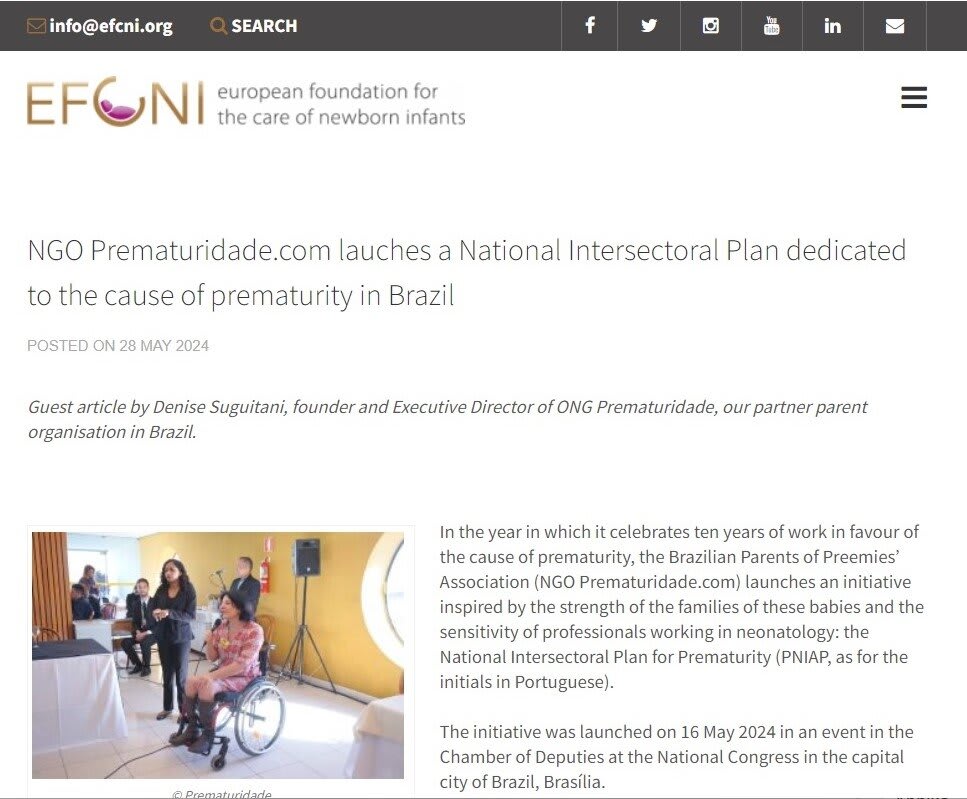A notícia do lançamento do Plano Nacional Intersetorial de Atenção à Prematuridade (PNIAP), anunciado recentemente pela ONG Prematuridade.com, foi destaque no site e na newsletter do mês de maio da Fundação Europeia de Cuidado para o Recém-nascido (EFCNI). Abaixo, o texto divulgado pela EFCNI. E, nesse link, você acessa a publicação original.
NGO Prematuridade.com lauches a National Intersectoral Plan dedicated to the cause of prematurity in Brazil
Guest article by Denise Suguitani, founder and Executive Director of ONG Prematuridade, our partner parent organisation in Brazil
In the year in which it celebrates ten years of work in favour of the cause of prematurity, the Brazilian Parents of Preemies’ Association (NGO Prematuridade.com) launches an initiative inspired by the strength of the families of these babies and the sensitivity of professionals working in neonatology: the National Intersectoral Plan for Prematurity (PNIAP, as for the initials in Portuguese).
The initiative was launched on 16 May 2024 in an event in the Chamber of Deputies at the National Congress in the capital city of Brazil, Brasília.
The aim of the Plan, that has a technical and political nature, is to engage civil society, the Government, politicians, healthcare professionals, the Judiciary, and other stakeholders, in the preparation, implementation, improvement, and monitoring of public policies that permeate the causes and consequences of preterm birth in Brazil.
Brazil is among the ten countries with the highest number of preterm births, with around 330,000 births occurring before 37 weeks of gestation, every year. Prematurity is the main cause of infant mortality among children under 5 years of age and can also leave physical and psychological consequences for babies and parents.
Other indicators and premises that justify the urgency of this initiative are well documented in national and international reports, plans and pacts, and in the country’s Federal Constitution itself. Sustainable Development Goals, from the United Nations (UN), National Plan for Early Childhood (Law No. 13,257/2016), and Born Too Soon Report, from the World Health Organization (WHO), are some examples of guiding documents that bring irrefutable arguments to prioritise public policies aimed at vulnerable newborns, such as preterm babies.
Preterm birth has a multifactorial origin and cannot always be prevented. However, it is known that initiatives aimed at sexual education for adolescents, reproductive planning policies, as well as improving access and quality of prenatal consultations can reduce prematurity rates and represent major challenges for Brazil.
In a joint action, the idea is, initially, to carry out a diagnosis of the prematurity scenario in the country, by collecting data and tracking public and private initiatives related to the topic, to then outline the implementation of the Plan. The action’s practical goals are the eradication of avoidable premature births and establishing equity in access to health as well as social justice for all premature babies and their families.
Throughout the year, there will be articulation with representative organisations to form working teams and create the guidelines and schedule for implementing the document. Meetings with parliamentarians and public hearings in the National Congress are also planned as an initial part of the Plan.
In addition to the health sector, the PNIAP will work on themes that cut across different sectors of society and, consequently, several Ministries, such as Education, Social Development, Assistance, Family and Hunger Erradication, Human Rights and Citizenship, Social Security and Environmental Affairs, and their respective plans and programmes. Among the themes to be worked on in the strategic axes of the PNIAP, Primary Health Care, vaccination, mental health, social inclusion, racial equality and indigenous peoples will receive a special look.
“It will be essential to rely on the expertise of those who build and execute public policies, such as parliamentarians, especially those who support the cause in the National Congress, in addition to the Ministry of Health itself and the institutions linked to it. Likewise, the collaboration of scientific societies, such as the Brazilian Society of Pediatrics, will be vital in this journey”, says the Executive Director of NGO Prematuridade.com, Denise Suguitani. She continues: “And the great difference of this initiative is that families, fathers and mothers of premature babies, will be part of all work groups and their voice will have the same representation and importance as those of the other stakeholders involved”. To summarise the approach, Denise Suguitani concludes, “Nothing about us, without us”.

 área dos profissionais
área dos profissionais


